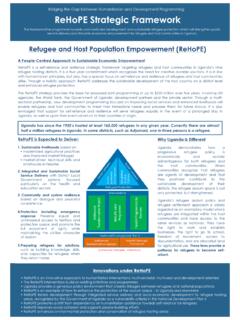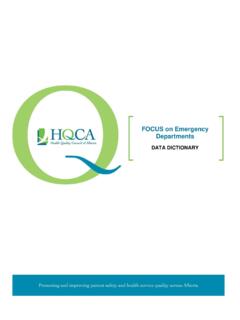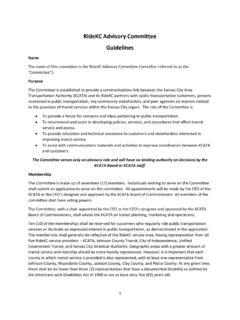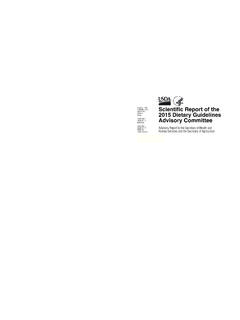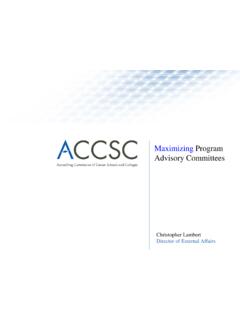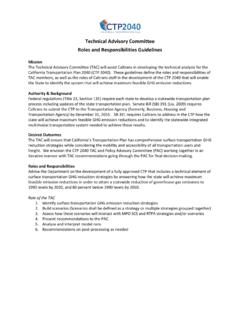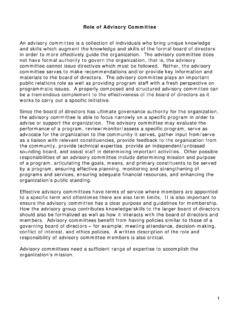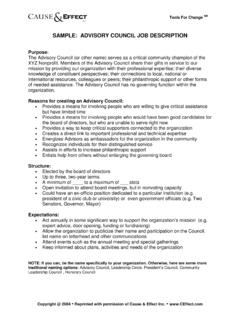Transcription of HQCA Patient and Family Advisory Committee (PFAC) …
1 HQCA Patient and Family Advisory Committee (PFAC) Member Role Description Purpose The HQCA Patient and Family Advisory Committee (PFAC) was created as a strategic initiative through the provincial Patient Safety Framework for Albertans published by the Health Quality Council of Alberta (HQCA). in September 2010. The PFAC is designed to leverage the experiences and perspectives of patients and their families to improve and promote Patient safety and health service quality in Alberta's healthcare system. Through the HQCA, the PFAC will work to promote Patient safety principles, concepts and actions in all aspects of Alberta's publicly funded health care system.
2 Position summary Patient and Family Advisory Committee (PFAC) members: support the HQCA to pursue opportunities to improve Patient safety and health service quality for Albertans;. embrace the concepts of Patient engagement and Patient centered care as they relate to health service quality and Patient safety;. advocate to the HQCA for the Patient / Family perspective and provides the Patient / Family perspective in HQCA planning and activities; and focus on issues of Patient safety and health service quality from the system perspective ( , identifying and influencing health system improvement in areas of Patient safety), and do not focus on individual cases or issues.
3 Scope This volunteer role is Advisory in nature, not activist in nature. The difference between these two roles is considered as follows: advisors seeks to inform and guide through their unique knowledge and by providing an opinion or perspective, while activists campaign (often externally) for a social change in order to drive a particular outcome. PFAC members have an advocacy role to the HQCA, in order to provide for the Patient / Family perspective on a broad range of Patient safety and health service quality topics. Because the PFAC is part of the HQCA, its scope is broad in covering all aspects within Alberta's publically- funded health system.
4 Responsibilities Learn about and consider, as appropriate, ongoing Patient safety and health service quality improvement initiatives in Alberta to advocate for Patient safety principles and Patient engagement. Provide a Patient / Family perspective on projects or topics related to Patient safety and health service quality improvement in Alberta, at the request of or with approval from the HQCA Board or management. Projects or topics might include the: o Development, implementation and promotion of Patient safety and health service quality improvement initiatives. o Education of patients/families on their role in Patient safety and health service quality improvement.
5 O Planning of healthcare service delivery systems. o Development of measures and indicators of Patient safety and health service quality improvement. Support and advance the work of the PFAC through the HQCA strategic and business planning process. Advise the HQCA Board and management on and participate in the development, review and/or monitoring of provincial ministry initiatives related to Patient safety and health service quality improvement; championing co-design where appropriate and feasible. Advocate for Patient safety and health service quality improvement perspectives in ongoing HQCA. initiatives, such as findings from Patient experience surveys.
6 Advocate for and collaborate with the HQCA to recommend or promote Patient safety and health service quality improvement strategies that inform patients/families of their role in achieving quality care. Contribute to special projects within the HQCA, including (but not limited to) focus groups, research interviews, and document reviews. Participate in the PFAC's annual self-assessment process (online, anonymous survey) to support continuous individual and PFAC improvement. Attend conferences, workshops, symposiums as an HQCA PFAC representative (optional). The optional use of social media will be supported to promote the work of the HQCA (while keeping in line with HQCA Policy 1701 Social Media), as well as other health quality/safety and Patient engagement organizations.
7 Qualities A passion for improving the healthcare experience for patients and families. Able to work collaboratively with a diverse population. Good listener respects other people's opinions and perspectives. Comfortable sharing thoughts and opinions in a group setting. Open and able to see beyond their own personal experience(s). Able to keeps a system-level perspective when considering a topic. Approaches problems and issues positively, with a goal of solving collaboratively through open, respectful communication. Able to promote the image and mission of the HQCA through positive interaction with staff, healthcare delivery staff (doctors, nurses, etc.)
8 , volunteers and the community. Time commitment PFAC members are appointed for a term of three years and may serve a maximum of teo terms. A meeting schedule is established at the beginning of the year. At a minimum, there will be four in-person meetings per year two in Edmonton and two in Calgary. In between in-person meetings, teleconferences will be scheduled as topics arise/as needed. Attendance is very important for the effective function of the PFAC and to be engaged in the PFAC's activities. It is requested that all attempts are made to attend PFAC meetings. In the event that a PFAC member is unable to attend in person, participation can occur through video or teleconference.
9 Opportunities will be presented to PFAC members to participate in other committees and other Advisory work that they can volunteer for as they are able. Expectations Attend meetings as scheduled and advise organizers when you're not able to participate;. Read meeting or session materials in advance and come to the session prepared to contribute;. Respect the collaborative process and understand that final decisions about care delivery and process improvements are the responsibility of health care administrators;. Respect the confidentiality of materials about patients and organizations;. While your own geographic location and experiences with the healthcare system may influence your perspectives, remain open to all ideas presented, keeping in mind members are not advocates for exclusive interests (specific diseases, community issues, populations), but are encouraged to add their input in all discussion topics; and Participate in the PFAC's annual self-assessment process (online, anonymous survey) to support continuous individual and PFAC improvement.
